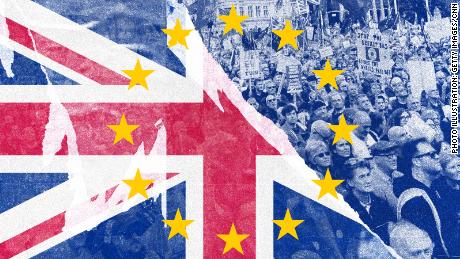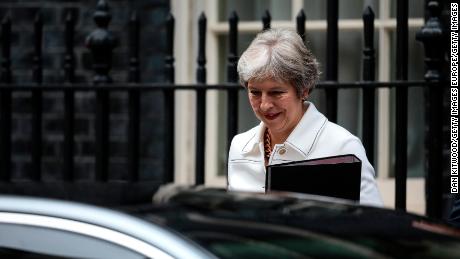Brussels (CNN)British Prime Minister Theresa May will face EU leaders Wednesday in a critical summit, as European Council President Donald Tusk warned of an increased risk that Britain would crash out of the bloc without a deal.
Talks over the weekend stalled over the thorny issue of the Irish border. The European Union wants the UK to agree a indefinite "backstop" or fallback position that would ensure an open border between Northern Ireland, which will be outside the EU, and the Republic of Ireland, which will remain an EU member state.
A source familiar with the talks told CNN that negotiators had been very close to a draft agreement, but that it was killed in London by May, who wants any backstop to be time-limited.
Now the British leader has less than 48 hours to turn things around, before she addresses a meeting of European leaders on Wednesday evening.
On Tuesday Tusk described the Irish border question as a "Gordian knot" -- a seemingly unsolvable problem that could only be resolved with bold actions.
"The problem is clear it is still the Irish question and the problem of the border between Ireland and Northern Ireland. And the so-called backstop. It looks like a new version of the Gordian knot," Tusk said in Brussels.
He urged May to come forward with new ideas when she addresses EU leaders.
One EU diplomat said there was still a "very thin opportunity" to strike a deal, and described a "sense of emergency" in Brussels.
Member states were hoping that the British government would shift its position, but would nevertheless step up plans for a no-deal Brexit. "We are going to keep calm and see what the UK government can do... but on our side we need to be ready," the diplomat told CNN. "We need to provide security to our citizens and to our companies."
May briefed her Cabinet on Tuesday, and called for unity after the meeting. A Downing Street spokesperson said May wanted her government to "stand together and stand firm" to achieve a Brexit deal that delivered on the result of the 2016 referendum.
Despite earlier British media reports that some Cabinet ministers were preparing to resign, Downing Street said none had threatened to do so on Tuesday. There was was "no suggestion in Cabinet that ministers were ready to quit," the spokesperson told CNN.
No-deal woes
In the complicated process of extricating the UK from the EU, many issues have been settled. But the biggest outstanding problem remains the issue of how to avoid the need to construct new infrastructure along the Irish border.
Removing checkpoints was a key part of the Good Friday Agreement that brought peace to the province after years of deadly violence.
European leaders advocate a "backstop" agreement, whereby failing other solutions, Northern Ireland will remain closely tied to European regulations on goods and services, including customs arrangements, after Britain leaves the bloc. May argues this amounts to splitting the UK into different customs zones, a political nonstarter.
But in the House of Commons on Monday , May said EU leaders had said there was not enough time to evaluate her counterproposal, that the whole of the UK remain inside the EU's customs union on a time-limited basis.
Tusk warned EU leaders Monday that they should be ready for the worst.
"We should ... remain hopeful and determined, as there is good will to continue these talks on both sides. But at the same time, responsible as we are, we must prepare the EU for a no-deal scenario, which is more likely than ever before," he said.
May had a rough ride in the House of Commons Monday. In an emergency statement May defended the "real progress" made in negotiations, but she added that EU proposals on the Northern Ireland border "threatens the integrity of our United Kingdom."
Conservative MP Simon Clarke accused her of having "failed to reassure the house" over concerns that the backstop would be indefinite.
Four Conservative MPs -- along with multiple opposition lawmakers -- used the debate Monday to urge May to call a second referendum to allow the British people to have a say on whether to proceed with Brexit.
Opposition Labour leader Jeremy Corbyn blasted May's approach, saying "the Prime Minister's failure to stand up to the warring factions on her own side have led us to this impasse."
"There is a Brexit deal that could command the support of Parliament and the country -- a Brexit deal that would benefit Britain and allow us to rebuild our communities, regions and economy, and avoid any hard border in Northern Ireland -- but that is not her deal," Corbyn said.



















